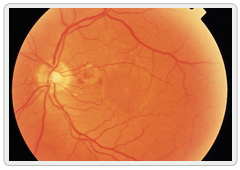 Age-related macular degeneration (ARMD) is a degenerative eye disease that causes damage to the macula, the central part of the retina at the back of the eye that allows us to see fine details clearly. ARMD can impair central vision. People who are affected by ARMD may have problems reading, driving, and performing activities that require clear central vision. In severe cases, ARMD makes close work like threading a needle or reading a book difficult or impossible. When the macula does not function correctly, we experience blurriness or darkness in the center of our vision. Although ARMD reduces vision in the central part of the retina, it does not tend to affect peripheral vision. ARMD alone does not usually result in total blindness. Most people continue to have some useful vision and are able to live independently. ARMD is the leading cause of irreversible vision loss in our senior population.
Age-related macular degeneration (ARMD) is a degenerative eye disease that causes damage to the macula, the central part of the retina at the back of the eye that allows us to see fine details clearly. ARMD can impair central vision. People who are affected by ARMD may have problems reading, driving, and performing activities that require clear central vision. In severe cases, ARMD makes close work like threading a needle or reading a book difficult or impossible. When the macula does not function correctly, we experience blurriness or darkness in the center of our vision. Although ARMD reduces vision in the central part of the retina, it does not tend to affect peripheral vision. ARMD alone does not usually result in total blindness. Most people continue to have some useful vision and are able to live independently. ARMD is the leading cause of irreversible vision loss in our senior population.
Stages of Age-related Macular Degeneration
The Dry Stage
This is the more common form. In this type of ARMD, the delicate tissues of the macula become thinned and slowly lose function over a period of years to decades.
Dry ARMD usually affects both eyes. If only one eye is affected, you may not notice any changes in your vision because your good eye may compensate for the weak eye. And the condition doesn't affect side (peripheral) vision, so it rarely causes total blindness.
Dry ARMD is one of two types of age-related macular degeneration. It can progress to wet ARMD, which is characterized by blood vessels that grow under the retina and leak. The dry type is more common, but it usually progresses slowly (over years). The wet type is more likely to cause a relatively sudden change in vision resulting in serious vision loss.
The Wet Stage
This is less common, but is typically more damaging. The wet type of ARMD is caused by the growth of abnormal blood vessels behind the macula. The abnormal blood vessels tend to haemorrhage or leak fluid, resulting in the formation of scar tissue if left untreated. In most instances, the wet stage develops in addition to the dry stage of ARMD.
ARMD develops differently in each person and the symptoms tend to vary. ARMD may cause a progressive loss of central sight; however, it does not usually cause total blindness. Peripheral vision is unaffected, allowing a certain amount of mobility in normal surroundings. If left untreated, the wet type of ARMD may progress rapidly.